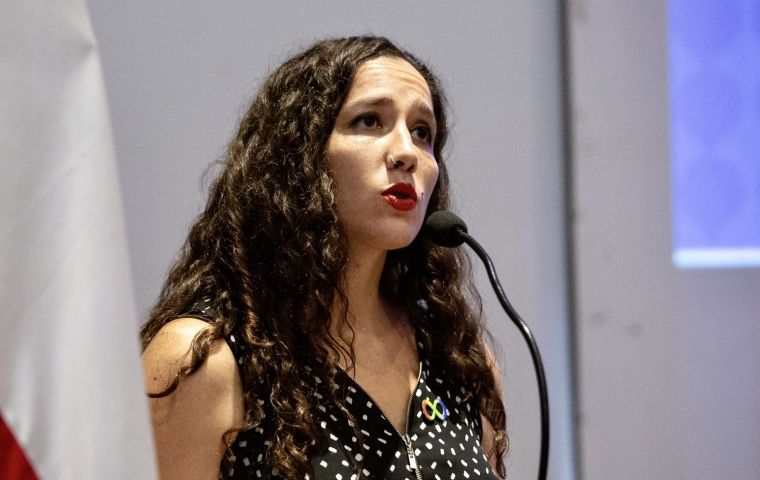MercoPress. South Atlantic News Agency
Nothing wrong with flu and Covid-19 vax campaign in Chile, minister says
 Albagli said more vaccines than ever have been administered so far this year
Albagli said more vaccines than ever have been administered so far this year Chile's Acting Health Minister Andrea Albagli insisted Monday that there was no lagging in the government's flu vaccination campaign. She made those remarks after politicians from the Unión Demócrata Independiente (UDI) tried to link an alleged shortcoming in this regard to five deaths due to that malady in the Ñuble region in the past few days and even hinted she should resign. “I don't know what failure they are talking about,” Albagli stressed.
“It is important that when we are analyzing public policies and population strategies that we give our opinion on the data, on the facts, and not only on opinions or perceptions. People may have the right to their opinion, but not to their own data,” Albagli pointed out before delving into the details of the number of flu shots administered in previous years.
“In 2018, on this same date, there was a total of 4,732,000 people vaccinated. In 2021, there were a total of 4,581,000 people vaccinated. By 2023, there were a total of 5,500,000 people vaccinated. This year, we have 6 million people vaccinated, that is, we have 1,300,000 people more than in 2021 and 500,000 people more than last year. So I don't know what failure they are talking about,” she argued while downplaying all claims that she should step down.
Albagli also reckoned there was an increase in viral circulation which does not necessarily translate into an increase in the number of cases.
Regarding the winter school recess, the official explained that ”the epidemiological situation today would not warrant a change in the decision on school vacations. This could change in the future, of course (...) but in the current scenario, there is no need to make such a decision.“
Furthermore, ”vaccination coverage in the school population is very advanced,“ she said. ”In Chile, the population between six and ten years of age reaches a coverage of 70%, and this is also the case in Ñuble, she added“.
The minister also said that for the time being flu vaccines were only going to be available free of charge to groups at risk. Albagli also ruled out any delay at the beginning of the vaccination campaign because ”it is not possible to start earlier because the vaccine is formulated according to the strain that circulated in the northern hemisphere, and then the vaccine used in the northern hemisphere is formulated with the one that circulated in the southern hemisphere (...) this year we made a decision with our communication campaign, we decided to be more explicit with the risks,“ she explained.
Albagli agreed more people could be vaccinated by now ”but that is not the same as saying that the campaign has advanced slowly because it is not real that there is a stagnation in vaccination.”
Andrea Albagli Iruretagoyena has a degree in psychology from Santiago's Catholic University, a Master's degree in Public Health from the University of Toronto, a Master's degree in Epidemiology from the Catholic University, and is working on her PhD in Public Health at the University of Toronto. She also has a diploma in sports psychology. She has worked for 10 years as an official at the Chilean Health Ministry and as a project consultant for the World Health Organization (WHO).
She started making headlines during the Covid-19 pandemic when she went public about being ordered to manipulate the data on the status of the virus in Chile: “I was ethically very uncomfortable with the way the pandemic was handled,” she said at the time.
In this scenario of mounting cases of respiratory diseases, the flu and Covid-19 vaccination campaigns have reached Santiago's Metro to boost immunization since May 23.
Injections are free of charge for healthcare staff, people aged 60 years or older, kindergarten and school personnel up to 8th grade, pregnant women, plus immunocompromised and chronic patients.




Top Comments
Disclaimer & comment rulesCommenting for this story is now closed.
If you have a Facebook account, become a fan and comment on our Facebook Page!